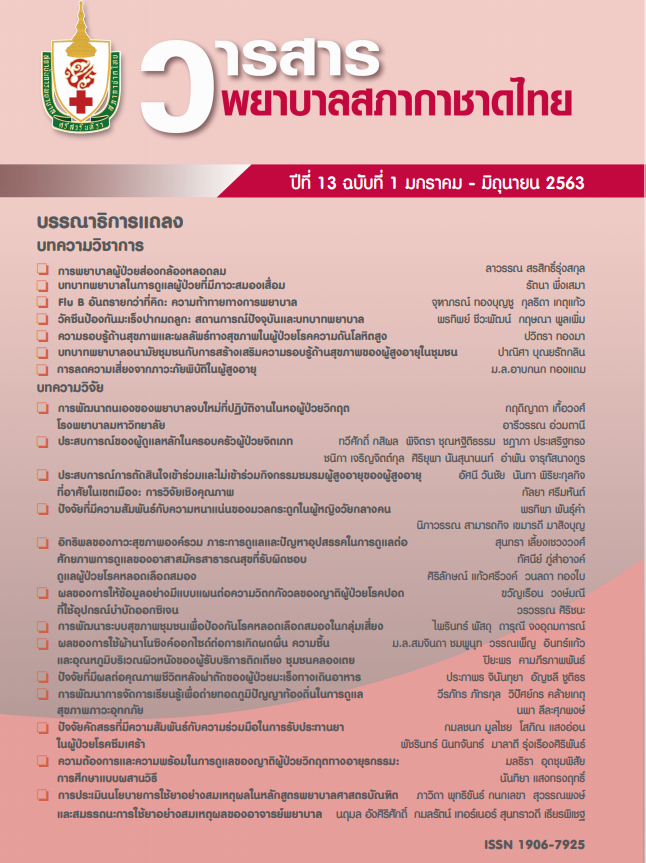Effect of Structured Information on Anxiety Among Family Caregivers of Patients with Respiratory Disease Using Oxygen Delivery Devices
Keywords:
family caregiver, oxygen delivery device, anxietyAbstract
This Quasi Experiment design aimed to examine the effect of structured information on anxiety among family caregivers of patients with respiratory disease using oxygen delivery devices. The subjects were 66 family caregivers for patients in the medicine general ward of King Chulalongkorn Memorial Hospital. Eligible subjects were selected by purposive sampling and separated into two groups; 33 subjects (control group) received usual nursing care, while the other 33 subjects. comprising the experimental group, received structured information based on concepts developed by Leventhal and Johnson. The structured information covered essential information related to caring for patients with chronic respiratory disease, including assessment of caregivers’ readiness, education using multimedia communications, educational handouts, and demonstration-based training. The caregivers’ anxiety was assessed before and after exposure to the structured information by Thai Hospital Anxiety and Depression Scale (Thai HADS). Data were analyzed by descriptive statistics, Wilcoxon Signed Ranks test, and Mann-Whitney U-test
The result showed that the post-care HADS scores in the experimental group were significantly lower than the pre-care HADS scores, (p< .001), Furthermore, the post-care HADS scores in the experimental group were significantly lower than those of the control group (p<.001).
. To conclude, structured information for family caregivers who take care of chronic respiratory disease patients requiring home oxygen therapy should be implemented before hospital discharge since it is likely to help in reducing symptoms of anxiety and making the caregivers feel more confident about caring for patients at home without fear of complications.
References
2. Division of Non Communicable Diseases. 5-Year National Plan for Prevention and Control of Non-Communicable Diseases (2017-2021). Bangkok: Emotion Art; 2017. (in Thai)
3. Medical Record and Statistics Department. Medical disease statistics lungs using positive pressure breathing apparatus Internal Medicine Department (2016-2017). Bangkok: King Chulalongkorn Memorial Hospital; 2017. (in Thai)
4. Meleis IA, Sawyer LM, Im EO, Messias DK and Schumacker K. Experiencing transitions: an emerging middle-range theory. ANS Adv Nurs Sci 2000;23(1):12-28.
5. Spence A, Hasson F, Waldron M, Kernohan G, McLaughlin D, Cochrane B, Watson B. Active carers: living with chronic obstructive pulmonary disease. Int J Palliat Nurs 2008;14(8):368-72.
6. Rioux JP, Narayanan R, Chan CT. Caregiver burden among nocturnal home hemodialysis patients. Hemodial Int 2012;16(2):214-9.
7. Boise L, Congleton L, Shonnon K. Empowering family caregivers: the powerful tools for caregiving program. Edu Gerontol 2005;31(7):573-86.
8. Nilliaum R, Kaewsasri A, Sinsawad P. Nurse’s role in preparing hospital discharge readiness for caregiver of the patient with acute myocardial infarction. Thai Journal of Cardio-Thoracic Nursing 2017:28(2):28-37. (in Thai)
9. Leventhal H, Johnson JE. Laboratory and field experimentation: development of a theory of selfregulation. In: Wooldridge PJ, Schmitt MH, Skipper JK, Leonard RC, editors. Behavioral science and nursing theory. St. Louis: CV Mosby; 1983. p. 189-262.
10. Johnson JE, Fieler VK, Jones LS, Wlasowicz GS, Mitchell ML. Self-regulation theory: applying theory to your practice. Pittsburgh, PA: Oncology Nursing Press; 1997.
11. Hafsteinsdóttir TB, Vergunst M, Lindeman E, Schuurmans M. Education needs of patients with stroke and their caregivers: a systematic review of the literature. Patient Ed Counsel 2010;85(1):14-25.
12. Harvey PW, Petkov JN, Misan G, Fuller J, Battersby MW, Cayetano TN, et al. Self-management support and training for patients with chronic and complex conditions improves health-related behavior and health outcomes. Aust Health Rev 2008;32(2):330-8.
13. Mulawee A. Technical consulting. Khon Kaen: Klang Na Na Witaya; 2009. (in Thai)
14. Laitinen P. Participation of informal caregivers in the hospital care of elderly patients and their evaluations of the care giver: pilot study in three different hospital. J Adv Nurs 1992;17(10):1233-7.
15. Yamane T. Statistics: an introductory analysis. 3rd ed. New York: Harper and Row; 1973.
16. Department of Psychiatry, Faculty of Medicine, Chulalongkorn University. Thai hospital anxiety and depression scale [Internet]. 2011 [cited 2018 JUL 2]. Available from: http://www.cumentalhealth.com/index.php?lay=show&ac=article&Id=539909318&Ntype=1
17. Thampanichawat W. Self-regulation theory: concepts and application in care of children and families. Thai Journal of Nursing Council 2010;25(4):2010. (in Thai)
18. Songsri C. Effect of counselling on coping ability among caregivers of patients with chronic illness. Journal of Sakon Nakhon Hospital 2019;5(2):50-59. (in Thai)
19. Saivaree J, Chucat W. Effect of an information program on the anxiety level of mothers of children undergoing open heart surgery. Songklanagarind Medical Journal 2007;25(3):179-84. (in Thai)
20. Jungul S, Charoensuk K. The Effect of instruction in pre opened heart patient by Video compact disc on knowledge regarding health practice and anxiety level. NJPH. 2015;25(1):157-166. (in Thai)
21. Panyasai K. Effect of information and emotional support on anxiety and satisfaction among family members of patients in general intensive care unit, Lampang Hospital [Thesis]. Changmai: Changmai Uneversity; 2010. (in Thai)
22. Dungdao A, Thepakorn S, Kotchakorn P. The Effect of systematic anesthetic informed consent on anxiety level in patients undergoing general anesthesia. Thai Journal of Anesthesiology 2012;38(2):102-108. (in Thai)
23. Srisupha-Olarn I, Ua-Kit N. The effect of meeting family-needs program on anxiety of family members of critically ill patients. Songklanagarind Journal of Nursing 2016;36(3):77-93. (in Thai)
24. Yooplao R. Effect of informational and emotional support on anxiety among family members of head injuried patients [Thesis]. Changmai: Changmai Uneversity; 2000. (in Thai)
Downloads
Published
Issue
Section
License
เนื้อหาบทความหรือข้อคิดเห็นต่างๆ ในวารสารพยาบาลสภากาชาดไทยนี้ เป็นความคิดเห็นของผู้เขียนบทความ ไม่ใช่ความเห็นของกองบรรณาธิการ หรือสถาบันการพยาบาลศรีสวรินทิรา สภากาชาดไทย






